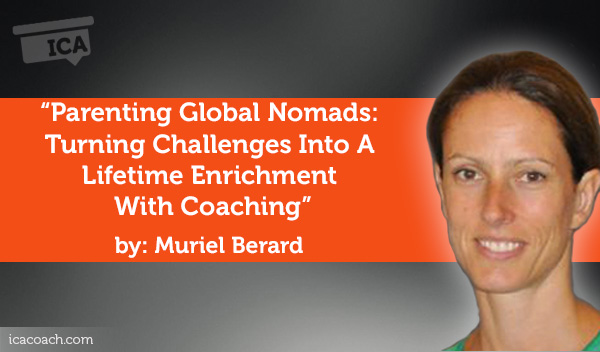Research Paper By Muriel Berard
(Life Transition Coach, CHINA)
Synopsis
This paper explores the complexity of raising happy and well-balanced global nomads children and how coaching can support parents to maximize the gifts of mobility.
Global nomads experience paradoxical benefits and challenges of growing-up with a high mobility lifestyle and among different cultures.
Parents having chosen to raise global nomads need to provide affirmation and support to help them navigate through mobility transitions and identity challenges. Away from their own family support systems and themselves facing expatriation challenges, parents can only rely on their natural instincts, support of new communities or any other resources they can find.
Coaching offers to global nomads’ parents the space and support to embrace their responsibilities in a positive and proactive way and turn challenges into a lifetime enrichment for their kids.
Introduction
Though the exact number of children being raised outside their passport country worldwide has not been tabulated, it is clear that in an increasingly global economy, the number is growing.
Global Nomads are children who share common characteristics and face similar difficulties. Navigating through mobility transitions and changes, building identity in more than one culture, they acquire unique skills that could prepare them to be the global citizens of tomorrow.
Who are global nomad children? What makes them different? What are the challenges of parenting abroad? And finally how coaching can support parents to turn overseas experiences in a lifetime enrichment for their children?
This paper will explore these different questions based on a review of the literature on this subject.
Who Are Global Nomads?
Anthropologist and sociologist Ruth Hill Useem first introduced the term “Third Culture Kid” (TCK) in the 1950s before Pollock and Van Reken adopted it. These authors defined and explained a TCK to be:
a person who has spent a significant part of his or her developmental years outside the parents’ culture(s). The TCK frequently builds relationships to all of the cultures, while not having full ownership in any. Although elements from each culture may be assimilated into the TCK’s life experience, the sense of belonging is in relationship to others of similar background (2009, p. 13).
Norma McCaig, herself a TCK, coined the term Global Nomad in 1984, which has been used synonymously ever since (Schaetti, 2000, p. 69).
However, in the global nomads’ definition, there is one small, but notable difference, which is the explicit addition of the reason for the mobility: the parental occupation.
What Makes Global Nomads Different?
Global Nomads share two major realities that affect the deeper parts of their cultural being, including their values, beliefs and worldview and make them different from other kids: growing up among different cultural worlds and high mobility. Both realities offer significant benefits and skills for most Global Nomad children but at the same time both produce challenges that must be recognized and addressed.
“The often paradoxical benefits and challenges of the TCK profile are sometimes described as being like opposite sides of the same coin, but in reality they are more like the contrasting colored strands of thread woven together into a tapestry. As each strand crosses with a contrasting or complementary color, a picture begins to emerge, but no one stand alone tells the full story” (Pollock and Van Reken 2009).
Benefits of High Mobility and Different Cultural Exposure
-
Worldview
The greatest benefit of a mobile lifestyle is the worldview developed by most TCKs. It is three-dimensional, with not only knowledge but also understanding and empathy (Pollock 1998). TCKs are likely to exhibit tolerance and cross-cultural understanding; they learn to see the world from different points of view. They can become a cultural bridge and an active, positive influence in an increasingly intercultural world.
-
Flexibility and adaptability
Seeing, hearing, tasting, and smelling new things is a way of life for most of them and contributes to their ability to accept and adjust to what is new and different.
-
Alert, intelligent and geographically aware (Pascoe 2006)
Many are also conversant in another language or have heightened interest and ability to learn a new language.
-
Mature, sensitive and skilled at listening (Pascoe 2006)
Factors contributing to this maturity include expectations and demands for certain behavior, relationship to adults in the international community, communication skills, and knowledge based on a “big world” exposure (Pollock 1998).
-
High Achieving
Often parents of global nomads are skilled professionals with record of high achievement themselves. As a consequence, expectations of performance might be higher for global nomads especially if they attend International School with high standards (Pascoe 2006).
-
Drawn to careers associated with service to the community or the world (Pascoe 2006)
Global nomads have most likely seen poverty and despair up close. They feel grateful for their own good fortune and want to help others improve the quality of their lives
All of these skills and abilities properly recognized and nurtured, are gifts that can strengthen global nomads self-confidence and empower them to counterbalance the many challenges of their mobile and multicultural life style.
